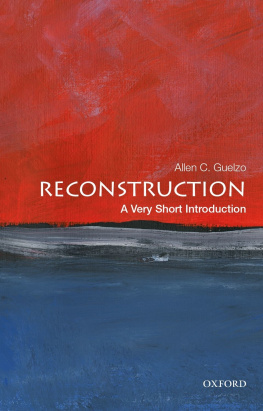The Ordeal of the Reunion
The Littlefield History of the Civil War Era
Gary W. Gallagher and T. Michael Parrish, editors
Supported by the Littlefield Fund for Southern History, University of Texas Libraries
This landmark sixteen-volume series, featuring books by some of todays most respected Civil War historians, surveys the conflict from the earliest rumblings of disunion through the Reconstruction era. A joint project of UNC Press and the Littlefield Fund for Southern History, University of Texas Libraries, the series offers an unparalleled comprehensive narrative of this defining era in United States history.
2014 The University of North Carolina Press
All rights reserved. Manufactured in the United States of America.
Set in Charter and Glytus by codeMantra. The paper in this book meets the guidelines for permanence and durability of the Committee on Production Guidelines for Book Longevity of the Council on Library Resources. The University of North Carolina Press has been a member of the Green Press Initiative since 2003.
Library of Congress Cataloging-in-Publication Data
Summers, Mark W. (Mark Wahlgren), 1951
The ordeal of the reunion : a new history of Reconstruction / by Mark Wahlgren Summers.
pages cm. (The Littlefield history of the Civil War era)
Includes bibliographical references and index.
ISBN 978-1-4696-1757-2 (cloth : alkaline paper) ISBN 978-1-4696-1758-9 (e-book)
1. Reconstruction (U.S. history, 18651877) 2. United StatesPolitics and government18651900. 3. Southern StatesPolitics and government18651950. I. Title.
E668.S943 2014
973.8dc23
2014012355
18 17 16 15 14 5 4 3 2 1
Contents
Illustrations
Let Us Have Complete Restoration, While You Are About It
Pardon. Shall I Trust These Men
Franchise. And Not This Man?
Slavery is Dead?
We Accept the Situation
All the Difference in the World
The Democratic Hell-Broth
Distribution of Prize-Loaves at the National Bakery
Mississippi Ku-Klux in the Disguises in Which They were Captured
Indian Outrages
Pacific Chivalry
The Big Thing
The American River Ganges
Time Works Wonders
Puck Wants A Strong Man at the Head of GovernmentBut Not This Kind
H. G. [Horace Greeley]: Let Us Clasp Hands over the Bloody Chasm
Blood Money
Little Phils Extinguisher
Worse than Slavery
Samuel J. TildenDied August 4, 1886
Death at the Polls and Free from Federal Interference
Acknowledgments
A book forty-six years in the making incurs debts so long that acknowledging them all would take a second volume. Librarians and curators at the Library of Congress rolled out carts of boxes in infinite array, and sometimes, on my regular reappearance at the desk, rolled their eyes as well. But nowhere, from the Historical Society of Pennsylvania to the Southern Historical Collection at Chapel Hill to the staff of the Austin Public Library, did I find a single staff member slow to provide material or advice, when asked. A number of them, particularly at the Alabama Department of Archives and History and the Illinois State Historical Society, asked as many good questions as they answered.
My colleagues, faculty and graduate, at the University of Kentucky made thoughtful comments on parts of the manuscript at brown-bag lunch seminars. I am tremendously grateful to those who agreed to read the whole thing; indeed, I have adopted every single suggestion they made. Jane Calvert asked provocative questions, and between Tracy Campbell, David Hamilton, and Paul Chamberlain, it is impossible to say which one had more of an effect on the final version. But nobody did more, line by line, word by word, and foolish error by foolish error, than my good friend Michael Fitzgerald at St. Olaf College. Doubtless he could have written a better book; in fact he hasat least three of them. At the University of North Carolina Press, Mary Caviness, invaluably keen of eye and tactful of admonition, made the right call in every aspect but one: I remain convinced that there is such a word as slurge, or if not, ought to be. My family, particularly my wife, the incomparable Susan Liddle, endured sheaves of notes sprinkled around countless floors, books laid on top of stove-burners, day-long hikes in the Sierras devoted to explaining just what distinguished the conquered provinces from the state suicide theory, and occasional fits of rage at how badly Charles Sumner had been treated. Finally, my parents. Evelyn W. Summers, as always, read through the manuscript with a clear eye for the incomprehensible and was always right. May she continue to be right, on the next book and the next! Clyde W. Summers listened to my ideas and gave the very best help he had in himas he always did with any friend, colleague, or student with whom he dealt. That listening began with the first raw ideas voiced in high school and continued for a lifetime. If this narrative of Reconstruction was built with the patient, deliberate speed and persistent devotion that he gave to the stone walls he raised from the earth, then his labors are its inspiration. I can hardly hope that it will endure so long.
Introduction
Just after the battle at Williamsburg in Virginia in May 1862, Charles Sumner rose in the Senate to make trouble. General George McClellan, reporting victory over retreating Confederate forces, had asked the War Departments advice on whether to inscribe the triumph on the armys banners. Sumner now tendered a resolution, barring anything of the kind. A radical Republican, impatient with McClellans conservatism and sure that blows against slavery alone could bring a triumph worth having, Sumner did not mean to do the general any favors, but spite did not explain his resolution at all. He wanted to make the point that this was no war against a foreign power; it was a struggle among a people who should have remained united and must become so again. Sumner was looking to peace and to reconstruction in its most basic sense, the reintegration of a country torn apart. Three years later, he offered an amendment that the paintings of Americas national history in the Capitol include none of victories won over our fellow-citizens.
That did not make him any less the champion of universal freedom and equal rights. Sumner believed that the two went togethermust go together. Until slavery and the racial prejudice that went with it were removed, no peace, no reunion, could last. But the desire for a reconciliation with white southerners, the sense that they still were and must again be fellow countrymen, was every bit as genuine and heartfelt. It was something he never forgot. Nor did his colleagues, conservative as well as radical, even if they refused to act on his resolution and the War Department gave regiments permission to place the names of battles on their flags. Nor is it something that historians should forget today.
This book makes no pretensions to being the history of Reconstruction, for two reasons: first, because such a thing cannot possibly exist, and second, because it already does. As to the first point, every scholar will view the time differently, and from a different perspective. The dreadfully entertaining and entertainingly dreadful story that Claude G. Bowers told of a white South put to the torture has nothing in common with Jackson Learss Rebirth of America except a sense of outrage based on an extremely selective use of sources and a talent to amuse. Heather Cox Richardsons integration of West and South, like that of Richard Slotkin, is as keen a recasting of the period as Richard Henry Bensels analysis of the postwar political economy or Leon F. Litwacks epic of emancipation, but only a reader already in the know would recognize what might seem like separate islands as once parts of a single continent.






